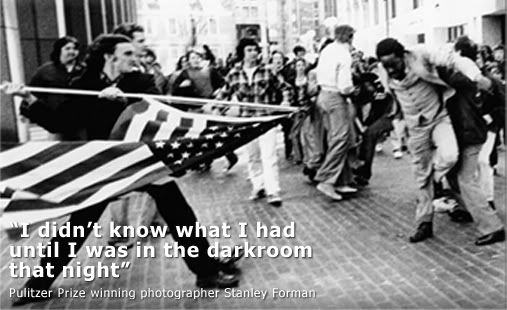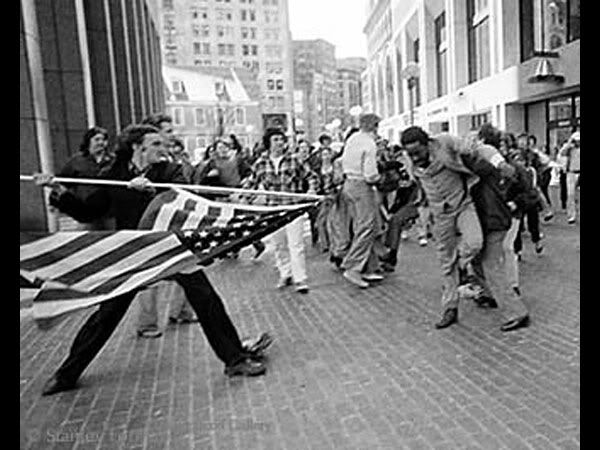<I'm reposting this little memory of Boston, which was my response to that thread about the South Boston meeting.>
I lived in Boston in the late 1970s, and frankly this story does not surprise me at all. Before moving to Boston, I had lived in pre-civil rights Virginia, and afterward I would live in Johannesburg and even crazy-ass Rustenburg and Zeerust, South Africa during the apartheid years and traveled through the deep south in the 1980s.
But
Boston in the late 1970s was the most racist, dangerous city I've ever lived in.
It's interesting that someone in the supremacist meeting thread cited the number of Black basketball players and coaches that Boston hired from the 1960s onward. But one thing the black athletes in Boston complained about in the media in the late 1970s was that they could not go to baseball games or other sport events for fear of random mob violence against them.
I think it's fair to say that Boston in the late 1970s, during their desegregation battles, may have been one of the most dangerously racist cities in all of American history. What made Boston unique, compared to say Johannesburg, Rustenburg or Zeerust during apartheid, or Richmond and Farmville, Virginia pre civil rights era, or Shreveport, Louisiana or Meridian, Mississippi in the 1980s (other shady cities I have been in) was this: Boston was the only place where much of the city was simply off limits to people of color. The moment you stepped into the wrong place, bricks, bottles, insults, fists, and whatever else was available to white citizens would begin flying. As a result, I never met a Black community anywhere in the world that was as demoralized internally and loathed externally as that of Boston in the 1970s -- and that includes the people of Soweto who at least knew history was on their side, while Boston seemed to be in a permanent time warp.
Most of us African Americans from other places knew, and were warned by our colleges, that you simply could not show your face in South Boston, the North End, a Red Sox game or a hockey game -- and that going downtown was always a serious risk as well. I worked as a security guard with several African immigrants who did not understand what was going on and they would travel the city not understanding why the moment they emerged from the subway in the wrong place they were met with a rain of bottles, bricks, and stones.
One night, I took the bus from my apartment in Roxbury to campus (of course, Boston was almost completely residentially segregated, so those of us who moved off campus lived in Roxbury). My bus was mislabeled as going to Cambridge. I was buried in some book when the bus came to a stop and the bus driver said, "last stop." I looked around and was not in the part of Boston I expected to be. The bus driver, who was black, said I had gotten on the bus to South Boston. I begged him to drive me somewhere else, but he said he couldn't. He pointed out that the red line was a few blocks away and added, "
If you run, you might make it." Even though it was late at night and I was running, people screamed racial slurs at me during the whole run to the red line.
The emblematic image of Boston in the mid to late 1970s was the photograph of African American lawyer and businessman, Theodore Landsmark, in the downtown civic center, being attacked by a white "civic leader" and anti-busing advocate, Jim Kelly, who held Landsmark while Boston teen Joseph Rakes tried to "run him through" with an American flag on a flag pole, the image being caught by Boston Herald American photographer, Stanley Forman. Landsmark did not know the attackers and simply was in the wrong place at the wrong time, but random mob violence was quite common.
Despite the image, Kelly ran for and was elected to the Boston City Council a few years later. The victim in the picture, Ted Landsmark, went on to become Dean of Graduate and Continuing Education at the Massachusetts College of Art, and later, president of the Boston Architectural College.
There are a few versions of the photograph, entitled, "The Soiling of Old Glory," but the more widespread seems to be the more closely cropped version, while the less cropped version has the added poignancy of capturing the colonial era "Old State House" in the background:


When I was finally able to leave Boston in 1980, I vowed never to return, no matter what. I had fond memories of Johannesburg after leaving in 1989 and returned there several times, but none of Boston. Unfortunately, I've had to travel to Boston on business three times in the last 29 years -- in my opinion an excessive rate of once per decade -- but hopefully this can be avoided in the future.